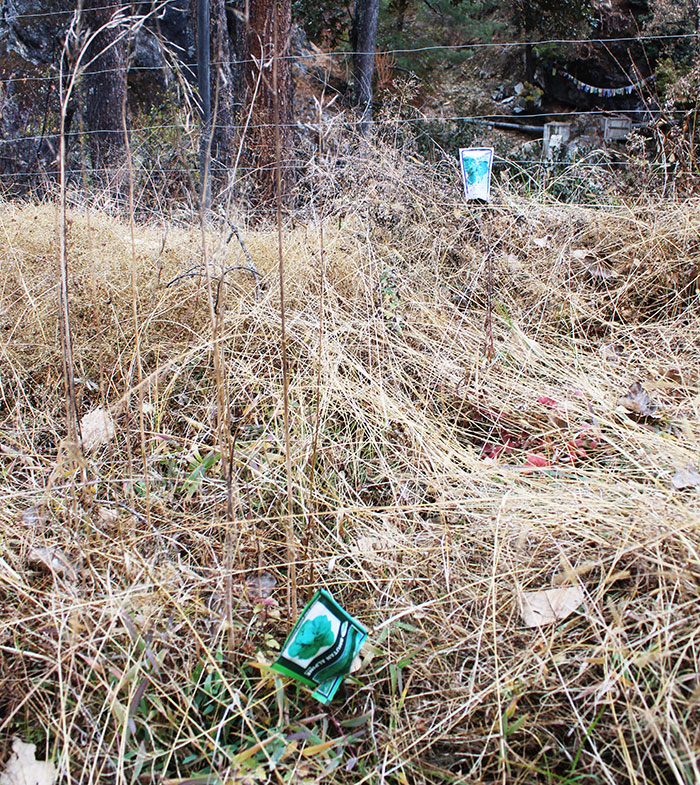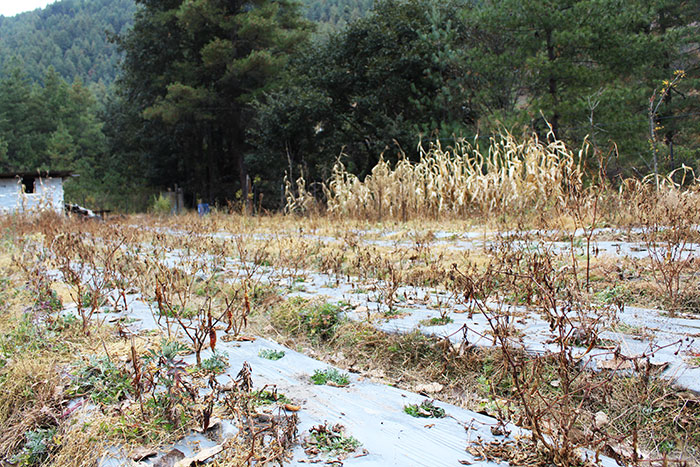Many left looking for other opportunities
Choki Wangmo
The fields look deserted. Long dry grasses and bushes have overtaken the electric-fenced fields. The shelters are locked and the cold winter frost has damaged the chillies that still hang from the dry stems.
The victims of Covid-19, the laid-off workers who joined the urban agriculture initiative withdrew in droves. Within eight months, 35 percent of the 22 groups have abandoned their fields. At Changtagang, north Thimphu, two of the three groups have abandoned their 50 decimal land allocated by the agriculture department.
The excitement of growing vegetables as an alternate source of income for the laid-off workers has gone with the long summer days.
A tour guide, Chador, recently stopped farming after his four friends left to drive taxis and start small businesses. He said that the land was initially allocated in the company’s name that couldn’t pay them. “We have resigned from the tour company we worked for.”
“Although I am interested to continue, I can’t work alone,” he said, adding that a group nearby had asked him to work in their allocated land and wanted to share the harvest but that group never came to work.
Chador said that the soil quality was poor and the harvest was bad. A sewerage water from a nearby house leaked into the field, damaging the crops. He cultivated peas but could only harvest about three kilograms (kg).
The coordinator of Changtagang, Hemlal Sharma said that agriculture ministry is yet to replace the two groups who withdrew from initiative.
Without greenhouses, a structure with walls and roof made of transparent material, in which plants requiring regulated climatic conditions are grown, frost in October had destroyed winter crops like spinach and radish. Chador’s group lost about 80 kgs of chillies. He said they were provided with mulching plastic for tomatoes but due to its thinness, direct sunlight damaged the product.
Other groups in different areas had two low-cost greenhouses where they cultivated spinach.

An abandoned field in Changtagang, Thimphu
Tshering Tashi, who left farming in Babena said that he was not built to become a farmer. “I can’t work in the field and I can’t even start other businesses since I was engaged in the farm. It is a double loss.”
He said earlier his family urged him to cultivate, but lack of experience and interest in farming had left him with poor harvest. “The gardens turned into a bush and I have told others to harvest what little I cultivated,” he said.
Another guide Chimi Rinzin said that he was interested but the tour operator he works for wanted to withdraw. “Since many employees left, the office and hotel have shortage of hands at work,” he said.
The remaining employees are renovating and maintaining the infrastructure.
Earlier, the group had 25 people working in the fields at Babena and Begana. They harvested about Nu 80,000’s worth of vegetables used in the hotel.
In Begana, all four groups abandoned the fields for various reasons.
A tour guide Tashi Chedup said that last season everyone worked hard but many are either not cultivating or withdrawing reasoning labour shortages to manage many plots and lack of time, while some have started small businesses. “They have difficulties adjusting.”
In May, the agriculture department identified 13.54 acres of private fallow land in Begana, Changtagang, and Kabesa in Thimphu, involving 139 laid-off workers, especially from the tourism sector for the urban agriculture initiative.
The initiative funded by Food and Agriculture Organisation as a part of Covid-19 contingency plan was aimed to address the current unemployment challenges in the country due to Covid-19 while achieving food security goals.
Many growers could earn income from the harvest, especially during the nationwide lockdown a few months ago.
Hemlal Sharma said that last season the groups in Changtagang sold Nu 223,000 worth of vegetables, each plot earning Nu 60,000-85,000.
For winter, they have cultivated onions and potatoes.
The groups in Babena are yet to get greenhouses.
Coordinator of the initiative with the agriculture department, BB Rai said groups from Begana withdrew from the initiative saying that they had transport and logistics related challenges due to the location of the place.
“We have replaced them with experienced workers who can arrange transport,” he said. Some groups, he said, are working and earned good money but many are reluctant to work.
The department provides technical support while the dratshang lhentshog leased land to engage laid-off workers from the tourism, entertainment and hospitality sectors in agriculture.


